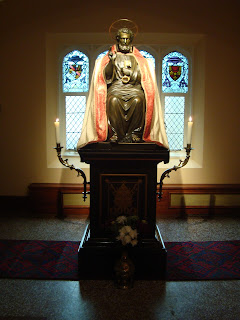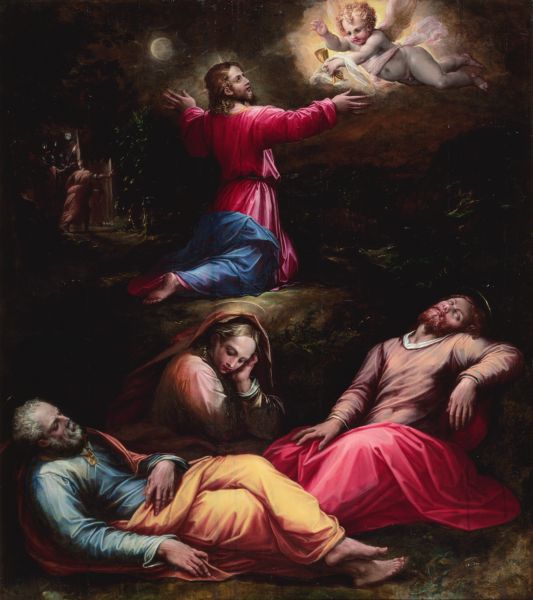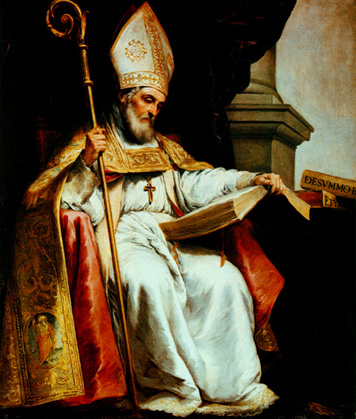I have, of late, been reading a book on Cistercian spirituality, and yesterday, I was reflecting on a chapter dedicated to reading the Word of God. The book itself is a little predictable and biased, in my view, but it is bursting with quotations and reflections from Cistercian saints and saints-to-be; I enjoy especially reading snippets from one of my spiritual heros, St Bernard of Clairvaux, who appears, in gimongous form, in one of our chapel windows at Oscott.
Another Cistercian, Gilbert of Hoyland, possibly a native of East Anglia, wrote of the reading of Scripture:
Hold fast to what you hold,
hold and touch
lingeringly and lovingly
the word of life.
Unroll the scroll of life,
the scroll which Jesus unrolls,
or rather, which is Jesus.
Wrap yourself in him,
wrap yourself in that fine linen in which he was wrapped
for he was clothed as light as in a garment.
Put on your beloved, our Lord Jesus Christ.
 |
| St Bernard: maybe writing one of his sermons |
Year two is starting to think about the Ministry of Lector, as we will be shortly considering applying for institution into that ministry, and be assessed for our suitability for the ministry. Last term, as a year group, we participated in
lectio divina, which is, as many of you will know, is a prayerful and contemplative method of reflecting on the Word found in Sacred Scripture. Through the reading of Scripture, we seek to put on Christ afresh, as Abbot Gilbert describes above, make him known throughout the world. This is particularly relevant for the lectorate ministry, as lectors are required, not only to proclaim the Word through the Scriptures in a liturgical manner, but to teach and expound to the faithful what is contained within it. It is clear, then, why this ministry is so important on the path of priestly formation.
When I was young, I was always made to read out stories from books to practice my reading at home; fortunately, I quite enjoyed doing this particular activity! I was quite pleased to read in my present reading book, that a Cluniac monk, Peter the Venerable once wrote that he was distressed that he was unable to perform
lectio divina in his monastery, because he was suffering from laryngitis. It is a great monastic tradition, in the middle ages, to read out Scripture communally, or read it out aloud quietly to one's self in the cloister, to allow the fullness of the written word to penetrate the other senses as well. Reading Scripture is not just about looking at the words on the page, it is about hearing them; what is the point of proclaiming the Word, if there is no-one there to listen, whether the listener is yourself, or a group, or the whole world! And to hear the Word of God, requires that it is proclaimed to you! Scripture is alive and breathing, it is a blanket, which provides security, warmth and comfort.
As part of our preparations, we, as a year group, are practicing our preaching: learning about writing homilies and proclaiming them to others. As you may have been following on here, I was fortunate enough to be given two opportunities to speak to congregations during my recent pastoral placement in Cambridge. Writing a homily for an Oscott audience, however, is a different ball-game entirely! Before we break up for half term this Saturday, another member of our group and I are preaching on the Sunday readings to our peers. Speaking to seminarians seems a lot scarier than speaking to
normal people! Fortunately, being a house of
formation, it is okay if we slip up, or make mistakes, bumble our lines, and fumble through our papers having lost our place or quotation, though I suspect mistakes cost rather a lot in the currency of credibility: all good when moving towards an economy of humility!
What is important is to remember that homily writing should begin and end with prayer; the preacher should first enwrap himself in the Word - to chew on the cud of the Scriptures - to allow it to penetrate his being, his intellect and his heart, to preach the Good News to others.
I'd best get ruminating...














